- Details
- Hits: 5781
Interlocking: Delray Tower, Detroit, MI
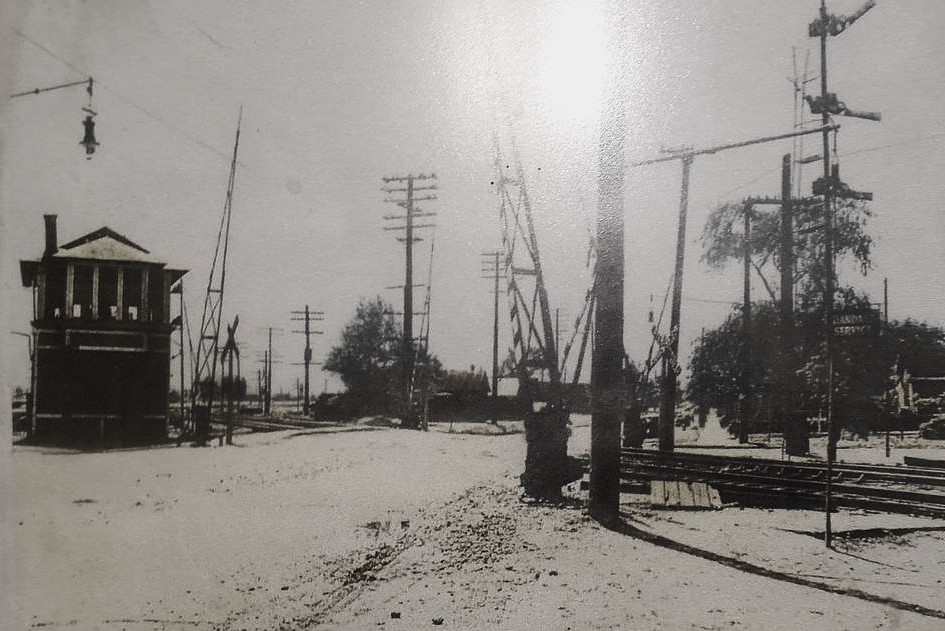
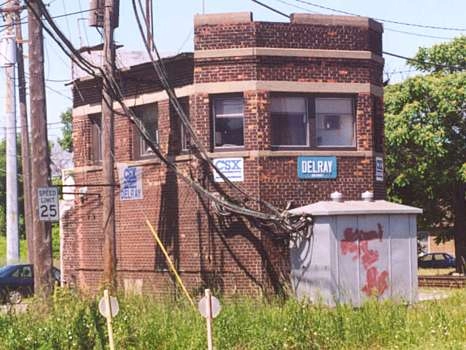
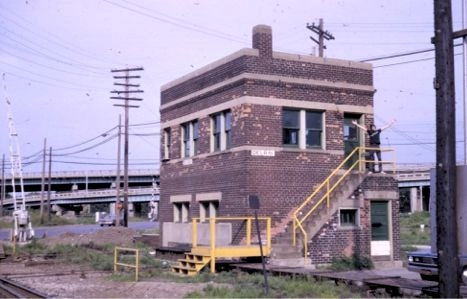
072941[ELNovak-CharlieWhippCollection].webp)
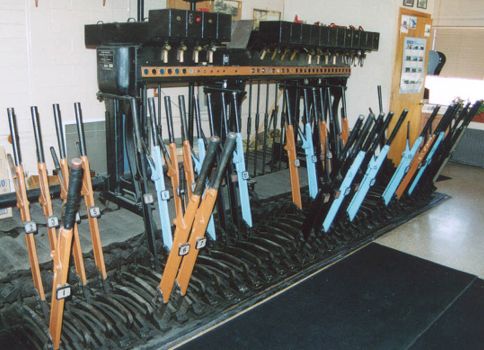
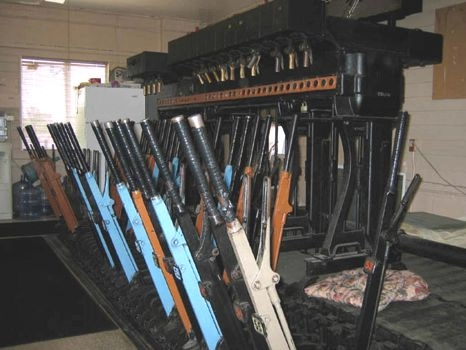
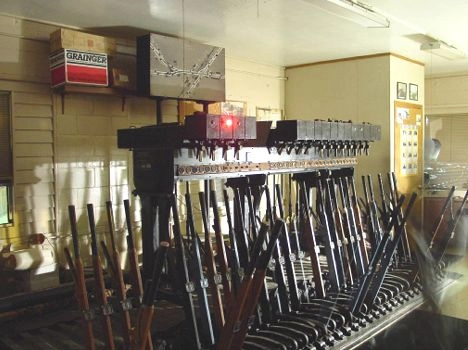
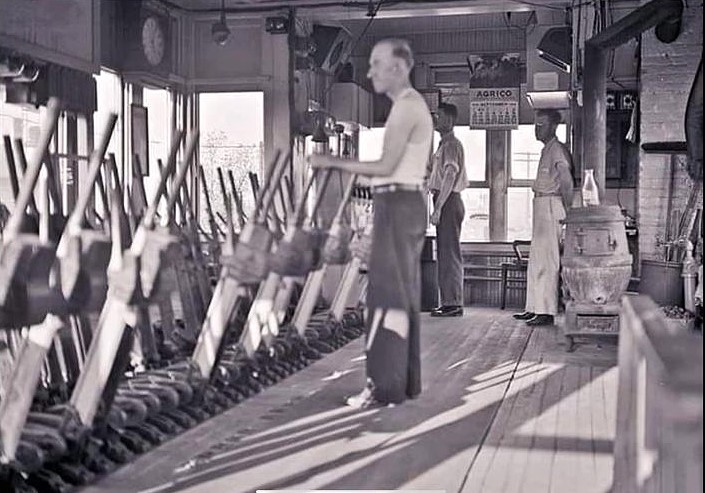
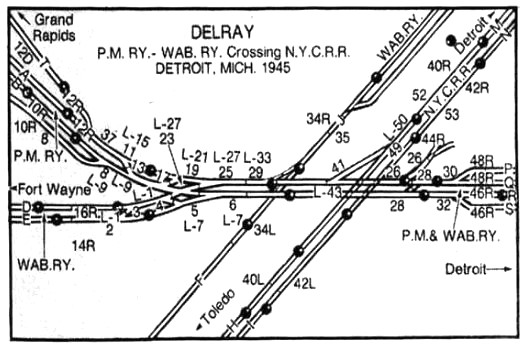
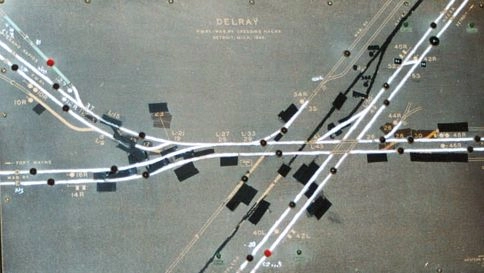
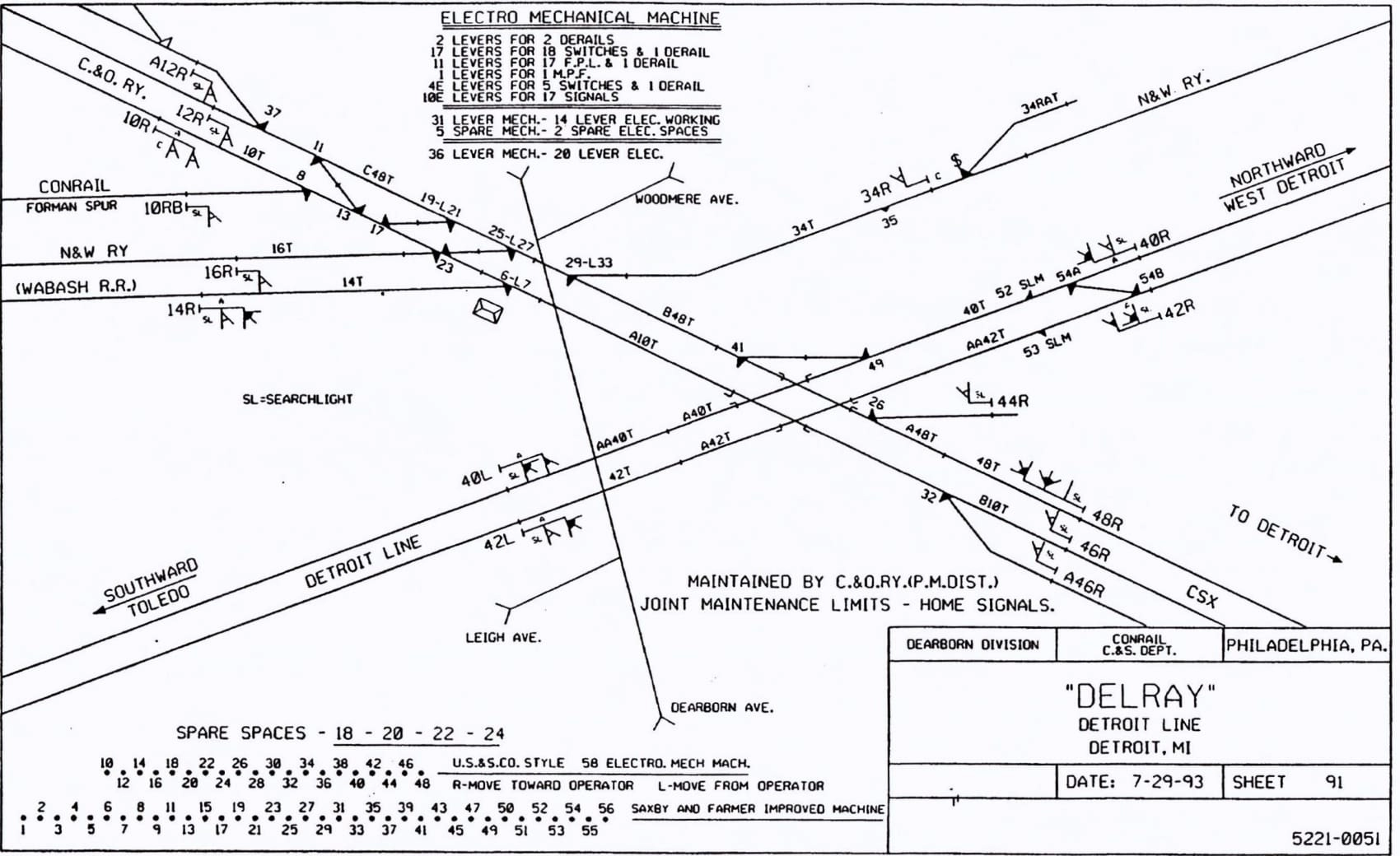 Delray interlocking tower was located on Dearborn Avenue in the Delray area of the City of Detroit. The tower controlled the crossing of several railroads and several other junctions nearby:
Delray interlocking tower was located on Dearborn Avenue in the Delray area of the City of Detroit. The tower controlled the crossing of several railroads and several other junctions nearby:
- Pere Marquette/Union Belt main line (Detroit to Chicago)
- Wabash main line (Detroit to Montpelier, OH)
- Wabash West Detroit branch (West Detroit to the Detroit River, cement plant)
- Michigan Central Toledo Branch (West Detroit to Toledo)
- Michigan Central industrial lead to Detroit River
- Michigan Central east end of Detla Yard
- Lake Shore & Michigan Southern Toledo Branch (West Detroit to Toledo)
- Detroit Street Railway Dearborn Avenue line
- Entrance to the Wabash roundhouse east of the interlocking
Photo info: Top, a view of Delray Tower and Dearborn Street in 1937. 2nd image, the interlocking tower at Delray, Michigan in southwest Detroit. Delray as of 2015, is the only staffed interlocking tower remaining in the City of Detroit not associated with a drawbridge. This tower was built in 1945 by the Pere Marquette, and replaced a wooden tower which was built around 1891. [Nathan Nietering]. 3rd photo, a view of the tower in 1972. [Charles Geletzke Jr.], 4th photo, the Pennsylvania Railroad's RED ARROW which is passing the old Delray Tower enroute to Fort Street Union Station around 8:00 a.m. The train carried sleeping cars, a bar-lounge, and a dining car. This photo was taken on July 29, 1941. The RED ARROW trains were named after a World War I infantry troop. Note that Delray Tower in this photo was replaced with the current tower in the mid-1940's, after World War II. The diamond being crossed is the NYC Detroit-Toledo line. [EL Nowak/Charlie Whipp collection]. 5th-7th photos, the US&S interlocking machine inside Delray Tower from various directions, in 2003 photos. The black levers are switches, blue levers are locks, and the brown levers are out of service. The end lever, #55, is the directional lever. The "pistol grip" levers above the "armstrong" levers run the signals in the interlocking. The 8th photo, an inside view of the tower and the leverman is lining up a route. 1939 image. This would be the old tower before it is replaced about 1945. 9th is a photo of the diagram from the new 1945 replacement project. [DFP], 10th photo, an actual photo of the model board at the tower. The 11th photo is of the model board overhead. In this 2003 photo, note that many of the original signals and switches which were in service in 1943, have been removed and taped over. [Nathan Nietering]. 12th photo is a 1993 track diagram at Delray.
Notes
This was one of the busiest interlocking towers in Detroit and is one of last two towers in operation in Michigan which are not associated with a drawbridge (the other is BO Tower in Kalamazoo). Editors note: Both are no longer staffed, remoted by dispatchers.
Location: 42o17.593'N / 83o07.780'W.
Time Line
1890. The original interlocking tower is installed at Delray. [RSG-1946-05]
1903. This tower was a Saxby-Farmer lever machine installed by Union Switch & Signal Co. [MCR-1904]
1935. Southbound Michigan Central trains approaching Delray were required to whistle ( _ _ o) for a route to Delta Yard, and ( o o _ ) for a route to the Pere Marquette. [MC Detroit Yard EE Timetable No. 76]
Delray communicated on Grade Line No. 5 (3 short). Also on this grade line were River Rouge Depot Yardmaster (2 long); Rouge Drawbridge (4 short); West Detroit (2 short); and YD Tower (1 long, 1 short, also known as Pleasant Street). [MC Detroit Yard EE Timetable No. 76]
1940. The traffic over this interlocking includes about 90 trains on the first trick daily, about 95 on the second, and 75 on the third, totaling 240 line-ups daily. [RSG-1946-05]
1945. An earlier tower was replaced with a brick tower and interlocking consisting of 56 electromechanical and 346 mechanical levers and 20 electrical locks. [PM45]
2020. November 16. The 2nd main line on the former Union Belt is removed through the interlocking and all signals are replaced. The tower is deactivated, being remote controlled by the CSX in Jacksonville. This was the last staffed interlocking tower in Michigan, not at a drawbridge. The interlocking is remoted by the "RN" dispatcher in Jacksonville, FL.
Editor's Note: Retired railroader and historian Jim Harlow, Ken Borg and others have written several detailed articles about the Delray crossing for The Semaphore, a quarterly publication of the Grand Trunk Western Historical Society. Please see the Spring and Summer, 2020 and the Winter, 2021 editions. They are excellent articles.
Railroads Arriving at Delray Junction
- 1857 - The Detroit, Monroe & Toledo builds north from Monroe through Delray and Detroit Junction (later West Detroit) to Beaubien street - became the Michigan Southern & Northern Indiana, the Lake Shore & Michigan Southern and later the NYC.
- First railroad in the Delray area. Crosses the River Rouge on a bridge.
- Crossed what is now Dearborn Avenue, a road that roughly paralleled the Rouge River northwest to the Village of Dearborn.
- 1873 - The Toledo, Canada Southern & Detroit Railway completes a line from Grosse Isle through Delray to West Detroit - became the Michigan Central in 1882.
- This line is parallel to and east of the LS&MS.
- 1881 - The Wabash railroad builds into Detroit from Fort Wayne, IN, via Delray to West Detroit.
- Initially, it curves north at Delray, running parallel to and west of the LS&MS.
- 1882 - The Detroit Union Railroad Depot & Station company builds 4.6 miles from 18th Street to Delray. In 1889 this line is leased to the Detroit, Lansing & Northern, the Flint & Pere Marquette, and the Wabash jointly. This line connects with the Wabash at Delray and later the F&PM.
- This connection between the DURD&S and the Wabash resulted in the first railroad grade crossing at Dearborn Avenue in Delray, with the Wabash crossing both the LS&MS and the MC.
- 1889 - A predecessor to the Detroit United Railway (DUR) builds a single track street car line down Dearborn avenue, from Jefferson Ave. to Fort Street. Note: Date is estimated. [DSR1]. This line was removed in April, 1925.
- 1893 - The Flint & Pere Marquette builds a line to Fort Street Union Depot in Detroit, via Oak, Rougemere and Delray - becomes the Pere Marquette in 1899.
- This line crosses the LS&MS and MC using the 1882 Wabash crossing.
- This same year, the Wabash builds a new bridge over the Rouge River and reroutes its line to Delray over the current route. The old right-of-way becomes an industrial siding to the Detroit Carbon Works and other industries along the river.
- A junction with the Wabash line is established just west of the crossing.
- 1903 - The Detroit & Toledo Shore Line enters Detroit from the south, using trackage rights on the Wabash from the Rouge River, through Delray and north to West Detroit and beyond. [MRL]
- The D&TSL establishes a junction at Victoria Avenue (just south of the Rouge River), and uses the Wabash bridge to reach Delray and beyond.
- In the Conrail era, the D&TSL negotiates trackage rights from the Dearoad area to West Detroit on Conrail's main line through Delray.
- 1920. The Pennsylvania comes through Delray on Wabash trackage rights. It joins the Wabash line just west of the Rouge River and uses it to reach Fort Street Union Station.
- Freight service is added and the PRR becomes part owner of the Union Belt of Detroit, the successor to the DUD&S.
- The PRR shared a roundhouse with the Wabash, just east of Delray Tower.
- 1921. The Union Belt of Detroit is formed through an operating agreement by the PRR, Wabash and Pere Marquette. It operated the railroad between Delray and 6th street interlocking at FSUD.
Railroad Crossing Protection and Interlocking Towers at Delray
- 1857 - First railroad (LS&MS) passes through Delray, No crossing. Two other parallel railroads follow (MC and Wabash).
- 1882 - First Crossing. Wabash and DUD&S establish the first crossing here. It is protected by a ground-based crossing tender. It may have had other non-interlocked signals.
- This crossing was more of a junction, with the Wabash coming north and crossing the LS&MS and MC on a "wye" track to the DUD&S. It was apparently not interlocked.
- 1893 - The first interlocking tower is completed at Delray, governing the crossing of the Wabash/PM line, the MC/LS&MS lines, and the Detroit Union Railroad (DUR) electric line.
- This is an attractive, two story wood tower, full of windows on the 2nd floor, as well as a windowed bay facing Dearborn Avenue.
- 1945 - Second interlocking tower. The old interlocking tower here is replaced with a two-story brick tower at approximately the same location.
- 56-mechanical levers, 20 electric levers. Signals/switches electrically operated.
- Street railroad removed by this time.
- By 1963 I-75 passes overhead, Wabash/PRR roundhouse has been removed.
- Semaphores still used at interlocking on Wabash in 1965.
- 2020 - Remote control. The interlocking at Delray is automated and controlled by the CSX dispatcher on November 16. [GTWHS-2021-Win]
Industry Near Delray - [GTWHS-2020-Spr] + others
- 1882 - Michigan Carbon Works opens their plant on Rouge River. [Ibid}
- 1889 - Detroit Exposition held for five years, along Detroit River just north of Zug Island.
- 1895 - Solvay Process Company purchases exposition ground to take advantage of salt deposits.
- 1903 - Detroit Edison builds a power plant adjacent to the Solvay property.
Bibliography
The following sources are utilized in this website. [SOURCE-YEAR-MMDD-PG]:
- [AAB| = All Aboard!, by Willis Dunbar, Eerdmans Publishing, Grand Rapids ©1969.
- [AAN] = Alpena Argus newspaper.
- [AARQJ] = American Association of Railroads Quiz Jr. pamphlet. © 1956
- [AATHA] = Ann Arbor Railroad Technical and Historical Association newsletter "The Double A"
- [AB] = Information provided at Michigan History Conference from Andrew Bailey, Port Huron, MI

